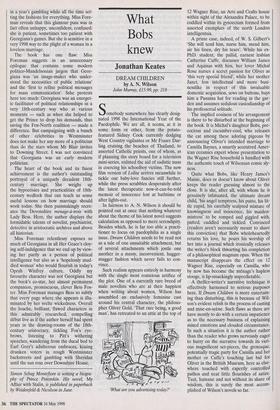What Bobs knew
Jonathan Keates
DREAM CHILDREN by A. N. Wilson
John Murray, £15.99, pp. 218 Somebody somewhere has clearly desig- nated 1998 the Intemational Year of the Paedophile. We are all, it seems, at it in some form or other, from the potato- featured Sidney Cook currently dodging West Country vigilantes or Mr Fraser Dar- ling cruising the beaches of Thailand, to assorted Catholic priests, one of whom, as if planning the story board for a television mini-series, enlisted the aid of sadistic nuns in coercing his schoolboy victims. The new film version of Lolita arrives meanwhile to tickle our baby-love fancies still further, while the press scrabbles desperately after the latest therapeutic now-it-can-be-told memoir of innocence lost at bathtime or after lights-out.
In fairness to A. N. Wilson it should be pointed out at once that nothing whatever about the theme of his latest novel suggests calculation as opposed to mere serendipity. Besides which, he is far too able a practi- tioner to focus on paedophilia as a single issue. Dream Children needs to be read not as a tale of one unsuitable attachment, but of several attachments which jostle one another in a messy, inconvenient, hugger- mugger fashion which never fails to con- vince.
Such realism appears entirely in harmony with the single most conscious artifice of the plot. One of a currently rare breed of male novelists who are at their happiest when writing about women, Wilson has assembled an exclusively feminine cast around his central character, the philoso- pher Oliver Gold. 'That rare being, a good man', has retreated to an attic at the top of `What are you advertising today?' 12 Wagner Rise, an Arts and Crafts house within sight of the Alexandra Palace, to be coddled within its gynoecium formed from assorted exemplars of the north London intelligentsia.
A prime case, indeed, of W. S. Gilbert's `She will tend him, nurse him, mend him, air his linen, thy his tears'. While his ex- PhD. student, the pallid, earnest lesbian Catherine Cuffe, discusses William James and Aquinas with him, her lover Michal Rose nurses a secret passion for Oliver as `this very special friend', while her mother Janet, less intellectual and more busi- nesslike in respect of this invaluable domestic acquisition, sews on buttons, buys him a Panama hat for reading in the gar- den and assumes sedulous custodianship of his professorial solitude.
The implied cosiness of his arrangement is there to be disturbed at the beginning of the book. It is Michal's daughter Bobs, pre- cocious and cucumber-cool, who releases the cat among these adoring pigeons by announcing Oliver's intended marriage to Camilla Baynes, a smartly accoutred Amer- ican ceramics expert whose presentation to the Wagner Rise household is handled with the authentic touch of Wilsonian comic sly- ness.
Quite what Bobs, like Henry James's Maisie, does or doesn't know about Oliver keeps the reader guessing almost to the close. It is she, after all, with whom he is genuinely infatuated, the ultimate dream child, 'his angel temptress, his putto, his lit- tle cupid, his carefully sculpted mixture of knowingness and innocence, his maiden- mistress' to be romped and giggled with, patted, cuddled and tickled. Convinced (readers aren't necessarily meant to share this conviction) that Bobs wholeheartedly returns his love, he pours his worship of her into a journal which ironically releases the writer's block thwarting his completion of a philosophical magnum opus. When the manuscript disappears the effect on 12 Wagner Rise, especially on Camilla, who by now has become the ménage's hapless stooge, is lip-smackingly unpredictable.
A thriller-writer's narrative technique is effectively harnessed to serious purposes here. If Dream Children is more entertain- ing than disturbing, this is because of Wil- son's evident relish in the process of casting and mise-en-scene. Such flaws as there are have mostly to do with a certain impatience as to the necessary business of explaining mixed emotions and clouded circumstance. In such a situation it is the author rather than the reader who grows nervously eager to hurry on the narrative towards its vari- ous magnificent set-pieces, the grotesque, potentially tragic party for Camilla and her mother or Cuffe's touching last bid for Oliver in the British Museum, here as else- where touched with expertly controlled pathos and neat little flourishes of satire. Taut, humane and not without its share of wisdom, this is surely the most accom- plished of Wilson's novels so far.


























































 Previous page
Previous page